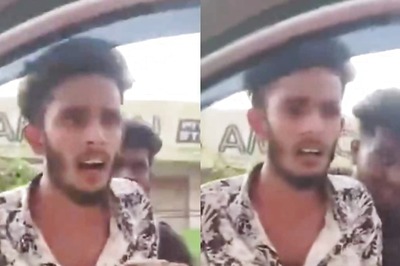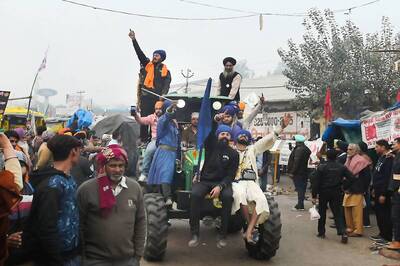
views
UNITED NATIONS: The U.N. special envoy for Libya accused spoilers on Thursday of trying to obstruct the holding of crucial elections in December to unify the divided North African nation, and the Security Council warned that any individual or group undermining the electoral process could face U.N. sanctions.
Jan Kubis told a ministerial meeting of the council that he spoke to many key players during his just-ended visit to Libya and all of them reiterated their commitment to presidential and parliamentary elections on Dec. 24, but I am afraid many of them are not ready to walk the talk.
He pointed to the failure of the Libyan Political Dialogue Forum, a 75-member body from all walks of life, to agree on a legal framework to hold elections earlier this month, putting a roadmap to end the decade-old conflict in the oil-rich nation in jeopardy. He also cited the failure of foreign forces and mercenaries to leave Libya within 90 days as required under last October’s cease-fire, and the failure to reopen the coastal road linking the countrys east and west, another key cease-fire provision.
Libya has been wracked by chaos since a NATO-backed uprising toppled longtime dictator Moammar Gadhafi in 2011 and split the oil-rich North African country between a U.N.-supported government in the capital, Tripoli, and rival authorities based in the countrys east, each backed by armed groups and foreign governments.
In April 2019, east-based commander Khalifa Hifter and his forces, backed by Egypt and the United Arab Emirates, launched an offensive to try and capture Tripoli. His 14-month-long campaign collapsed after Turkey stepped up its military support of the U.N.-backed government with hundreds of troops and thousands of Syrian mercenaries. That led to the October cease-fire and roadmap to elections adopted in Tunis a month later which included a transitional government.
Kubis urged members of the Forum to put their difference aside and agree on a proposal for the constitutional basis of elections that the House of Representatives could immediately adopt.
Interest groups, spoilers and armed actors must not be allowed to derail the process aimed at restoring the legitimacy, unity and sovereignty of the Libyan state and its institutions, he stressed.
A presidential statement adopted by the Security Council echoed Kubis call for immediate action and legislation to allow the High National Election Commission to have adequate time and resources to prepare for elections.
The council stressed that individuals and entities can face financial freezes and travel bans if the Security Council committee monitoring implementation of U.N. sanctions determines that they are engaging in or supporting acts that threaten Libyas peace, stability or security, or undermine its political transition, and underlines that such acts could include obstructing or undermining those elections planned for” in the Forum roadmap.
The Security Council again strongly urged all countries, Libyan parties, and relevant actors to fully implement the cease-fire agreement, including through the withdrawal of all foreign forces and mercenaries from Libya without delay.
Kubis warned that the continued presence of foreign forces and mercenaries is threatening the cease-fire.
It is imperative that Libyan and international actors agree on a plan to commence and complete the withdrawal of mercenaries and foreign forces, he said. Initial signals to this end are encouraging, but concrete steps and agreements are needed.
Kubis said the Joint Military Commission, comprising five members from each party, is key to implementing the cease-fire and to political progress, and warned that its vital role could unravel if the political process remains stalled.
Every effort must therefore be made to preserve its unity and to insulate its work from the detrimental effects of the political stalemate and the standoff between Libyas main political actors, he said.
Kubis cited standoffs between the transitional government and House of Representatives, the government and Hifters eastern-based Libyan National Army, and those who want to respect the timeline for the Dec. 24 election and those who would see the elections delayed.
He said the ramifications of the political impasse are already beginning to manifest themselves.
The House of Representatives failed to adopt the budget submitted by the transitional government, Kubis said. Hifters Libyan National Army refused to allow the government to extend its authority to areas it controls, the government and Presidency Council failed to agree on minister of defense who is crucial for implementation of the cease-fire, and the Joint Military Commission postponed the reopening of the coastal road to protest the lack of action on elections and withdrawing mercenaries and foreign forces.
The Security Council meeting followed last months conference on Libya in Berlin where Germany and the United Nations brought together 17 countries and Libyas transitional leadership to promote implementation of the cease-fire and roadmap to elections. Its presidential statement welcomed the conference conclusions.
German Foreign Minister Heiko Maas told the council that during the past year, Libya has come a long way towards peace and unity.
He urged the international community to take a strong stance against those who favor postponing the elections for selfish political motives and called on the council to reaffirm that it will not tolerate any obstruction — and that it will stay the course and make the progress in Libya irreversible.
Disclaimer: This post has been auto-published from an agency feed without any modifications to the text and has not been reviewed by an editor
Read all the Latest News, Breaking News and Coronavirus News here.


















Comments
0 comment